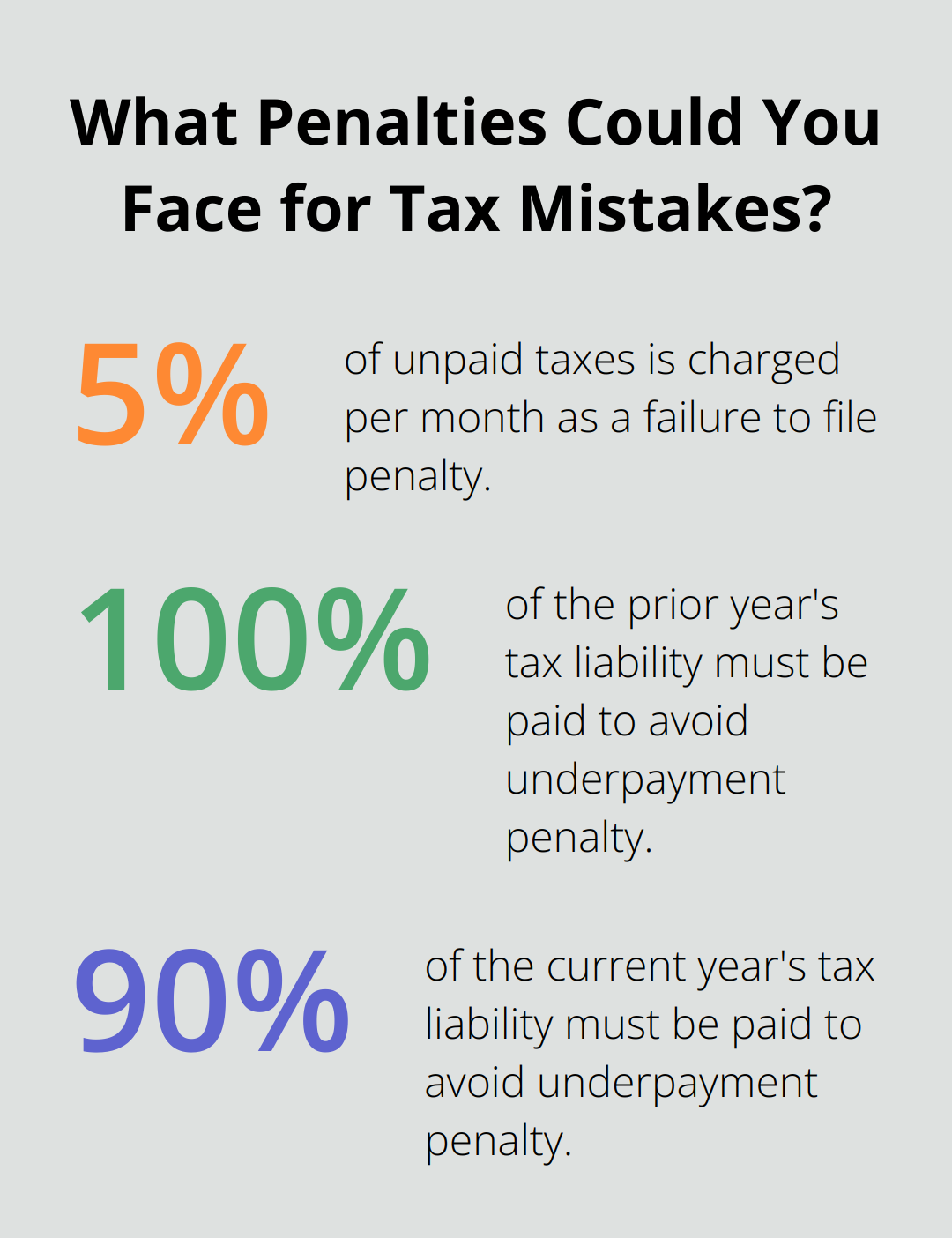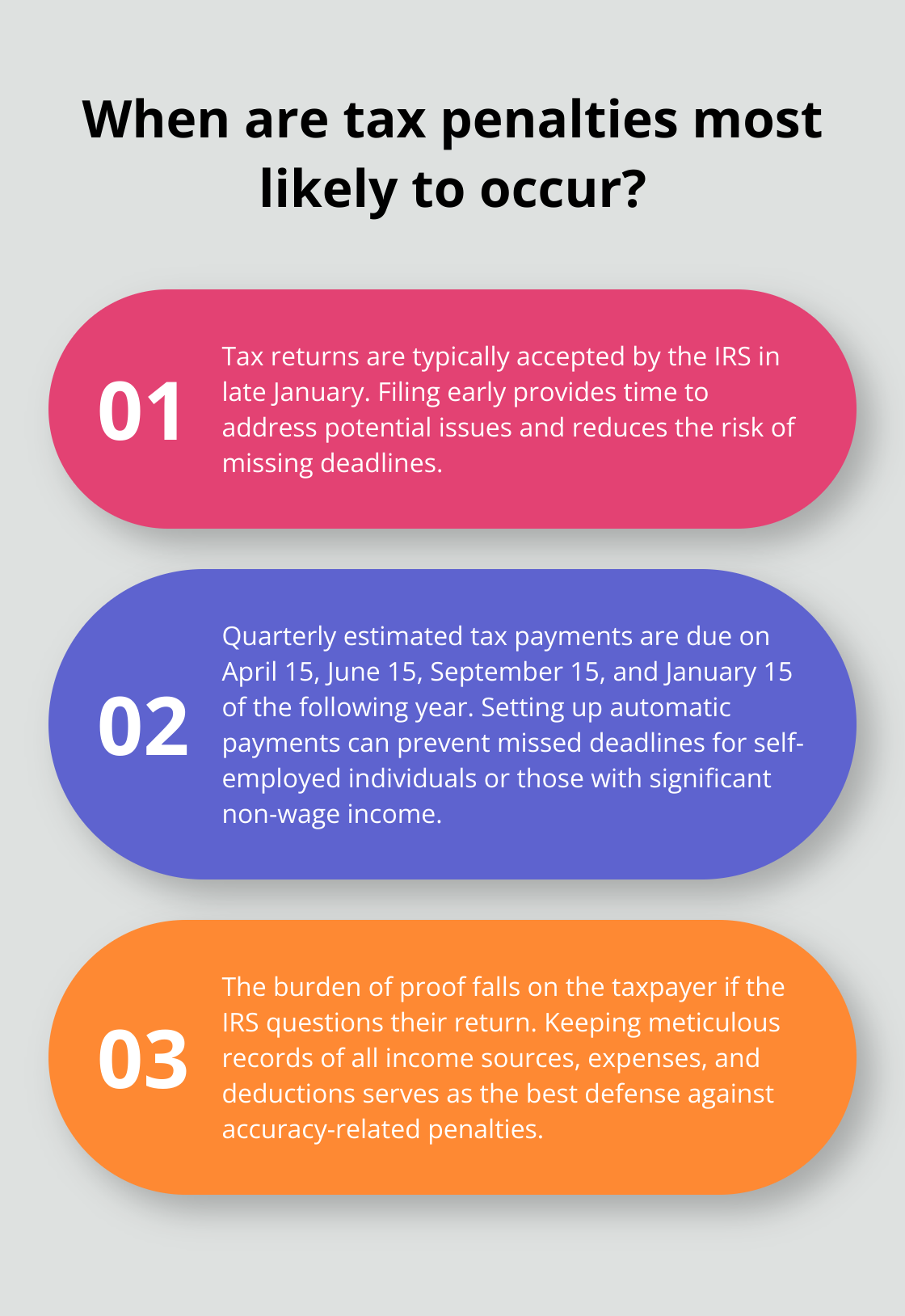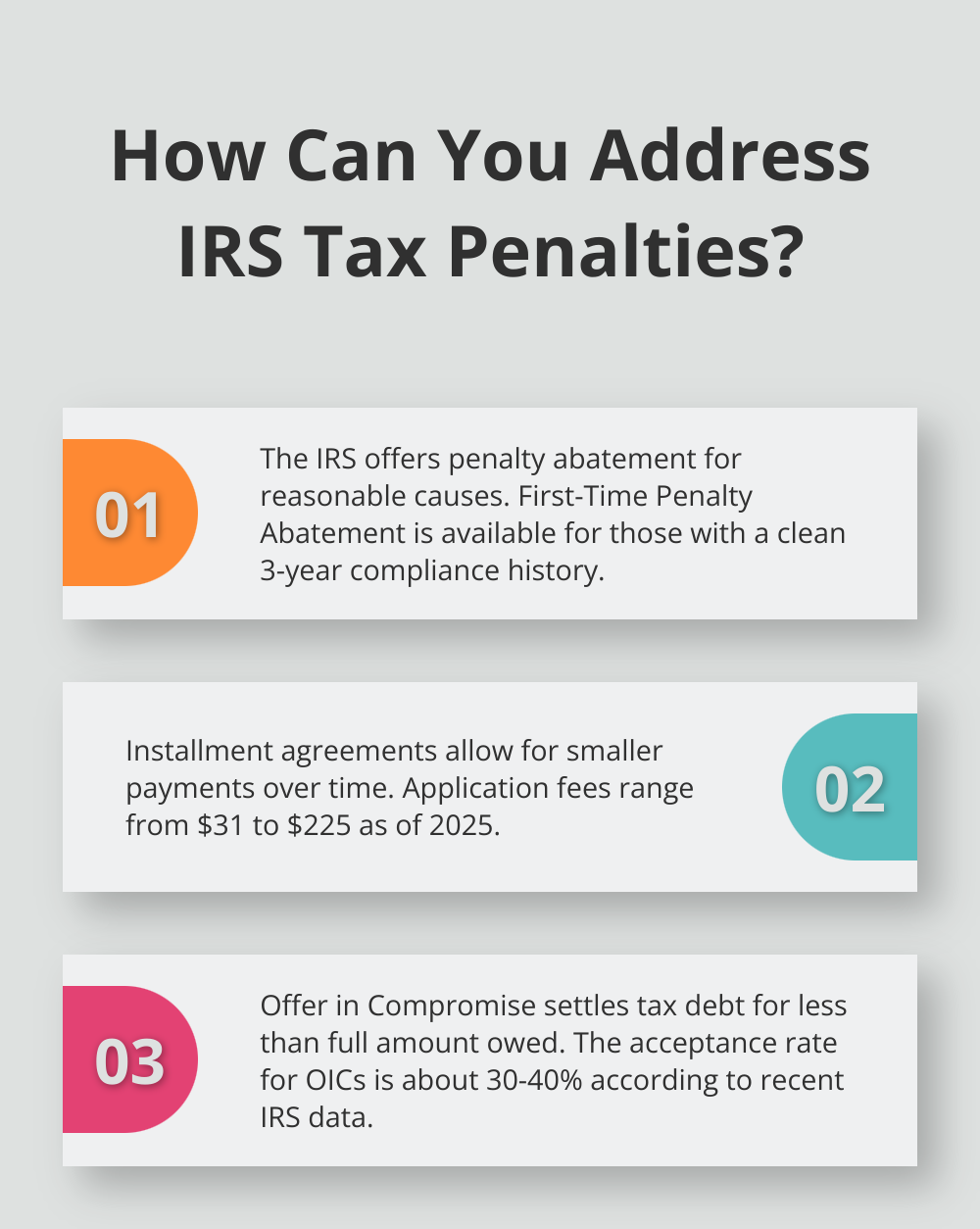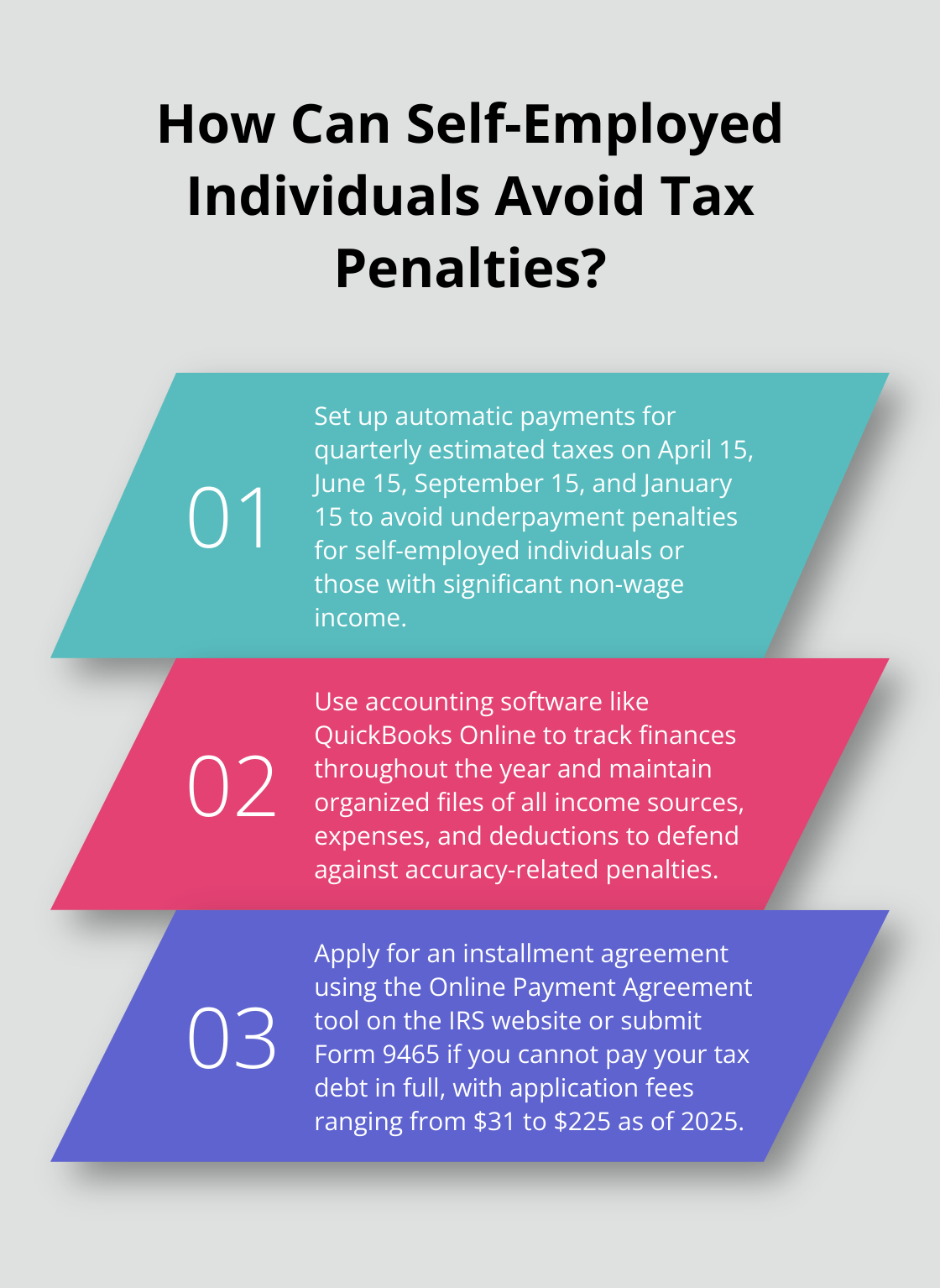Tax penalties can be a daunting challenge for individuals and businesses alike. At 7B Bookkeeping & Tax LLC, we’ve seen firsthand how these penalties can impact our clients’ financial well-being.
Understanding the types of tax penalties and how to address them is essential for maintaining your financial health. This guide will walk you through common penalties, prevention strategies, and options for tax penalty relief, helping you navigate the complex world of tax compliance with confidence.
What Are the Most Common Tax Penalties?
Tax penalties can significantly impact your financial health. The IRS imposes various penalties on taxpayers who fail to comply with tax laws. Understanding these penalties is the first step in avoiding them.
Failure to File Penalty
The IRS imposes a failure to file penalty when taxpayers miss the deadline for submitting their tax returns. This penalty is particularly severe, amounting to 5% of the unpaid taxes for each month (or part of a month) that a tax return is late. The penalty caps at 25% of your unpaid taxes.
Failure to Pay Penalty
Even if you file on time but fail to pay the full amount owed, you’ll face a failure to pay penalty. This penalty is 0.5% of your unpaid taxes for each month (or part of a month) after the due date. It can accumulate up to 25% of your unpaid taxes.
Underpayment of Estimated Tax Penalty
Self-employed individuals and those with significant non-wage income must make quarterly estimated tax payments. If you don’t pay enough throughout the year, you may face an underpayment penalty. The IRS calculates this penalty based on the federal short-term rate plus 3 percentage points. To avoid this, you generally need to pay at least 90% of the tax for the current year or 100% of the tax shown on your return for the prior year (whichever is smaller).
Accuracy-Related Penalty
The IRS may impose a 20% penalty on the amount of underpayment of tax if there’s a substantial understatement of income tax or negligence (or disregard of rules or regulations). This penalty often arises from claiming unsubstantiated deductions or unreported income.

Understanding these penalties is essential for effective tax planning. Try to file your taxes on time, pay the full amount owed, and report your income accurately to minimize the risk of penalties. In the next section, we’ll explore strategies to help you avoid these costly tax penalties altogether.
If you’re unsure about your tax situation or need assistance with filing a tax extension, consider seeking professional help.
How to Avoid Tax Penalties
File Early and Accurately
Don’t procrastinate on your taxes. Start collecting your documents early in the year. The IRS typically accepts tax returns in late January. Try to file as soon as you have all necessary information. This approach provides time to address potential issues and reduces the risk of missing the deadline.

If you can’t file by the due date, request an extension. However, an extension to file is not an extension to pay (you’ll still need to estimate and pay any taxes owed by the original deadline to avoid late payment penalties).
Stay on Top of Your Payments
Implement a system to ensure timely tax payments. For W-2 employees, this often involves checking that your withholdings are correct. The IRS Withholding Calculator can help determine if you need to adjust your W-4.
Self-employed individuals or those with significant non-wage income should mark their calendars for quarterly estimated tax payment due dates: April 15, June 15, September 15, and January 15 of the following year. Setting up automatic payments can prevent missed deadlines.
Keep Meticulous Records
Accurate record-keeping serves as your best defense against accuracy-related penalties. Maintain organized files of all income sources, expenses, and deductions. This includes bank statements, receipts, and any documents related to your taxes.
Consider using accounting software to track your finances throughout the year. Many taxpayers find that QuickBooks Online simplifies this process (especially when combined with professional bookkeeping services).
The burden of proof falls on you if the IRS questions your return. Good records can help substantiate your claims and avoid penalties.
Seek Professional Guidance
Tax laws are complex and ever-changing. If you’re unsure about any aspect of your taxes, don’t hesitate to consult a professional. A qualified tax expert can provide personalized advice and ensure full compliance with all tax regulations.
At 7B Bookkeeping & Tax LLC, we offer comprehensive tax services to help you navigate these complexities. Our team includes a Chartered Tax Professional and Enrolled Agent who can provide secure, remote tax preparation and reliable IRS representation.
Implementing these strategies can significantly reduce your risk of facing tax penalties. In the next section, we’ll explore your options if you do find yourself facing tax penalties despite your best efforts.
How to Address Tax Penalties
Request Penalty Abatement
The IRS may remove penalties if you demonstrate reasonable cause for your failure to comply with tax laws. Reasonable cause might include natural disasters, serious illness, or inability to obtain necessary records. The IRS also offers a First-Time Penalty Abatement program for those with a clean compliance history for the past three years.

To request abatement, write a letter to the IRS explaining your situation and provide supporting documentation. Be thorough and honest in your explanation, as the IRS reviews each case carefully.
Set Up an Installment Agreement
If you can’t pay your tax debt in full, an installment agreement allows you to make smaller, manageable payments over time. The IRS offers several types of installment agreements, including short-term plans (120 days or less) and long-term plans.
To apply for an installment agreement, use the Online Payment Agreement tool on the IRS website or submit Form 9465. The application fee varies based on your income and the type of agreement (ranging from $31 to $225 as of 2025).
Explore an Offer in Compromise
An Offer in Compromise (OIC) is an agreement between you and the IRS to settle your tax debt for less than the full amount owed. This option is typically available if you can’t pay your full tax liability or if doing so would create financial hardship.
The IRS considers your ability to pay, income, expenses, and asset equity when evaluating an OIC. It’s important to note that the acceptance rate for OICs is relatively low – about 30-40% according to recent IRS data. Therefore, you should carefully assess your eligibility and prepare a strong application.
Seek Professional Assistance
Navigating tax penalties and relief options can be complex. Professional tax experts can provide invaluable assistance in dealing with the IRS and finding the best solution for your situation. They can help you understand your options, prepare necessary documentation, and communicate effectively with the IRS on your behalf.
Tax experts can offer personalized guidance tailored to your specific circumstances. Their expertise can prove invaluable in resolving tax issues efficiently and effectively.
Final Thoughts
Tax penalties can overwhelm individuals and businesses, but understanding and proactive management can minimize risks. Strategies like early filing, timely payments, and meticulous record-keeping help maintain good standing with the IRS. If you face penalties, options such as penalty abatement, installment agreements, or an Offer in Compromise provide paths to tax penalty relief.

Proactive tax management extends beyond penalty avoidance; it empowers you to control your financial future. Staying informed, organized, and compliant reduces stress and saves money, allowing you to focus on personal or business goals. Professional guidance can prove invaluable in navigating complex tax situations and finding optimal solutions.
At 7B Bookkeeping & Tax LLC, we offer comprehensive financial services tailored to your needs. Our team of experts (including a Chartered Tax Professional and Enrolled Agent) provides secure, remote tax preparation and reliable IRS representation. Contact us today to learn how we can help you achieve peace of mind in your tax affairs.

